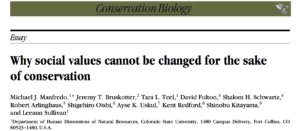A recent study conducted by researchers from The Department of Human Dimensions of Natural Resources, Colorado State University has been noted as one of the most influential papers measured by research metric firm, Altmetric. The paper currently has a score of 107 and was in the top .9% all-time (99th percentile), of all research outputs scored by Altmetric and was in the 97th percentile for outputs of the same age. Further, the paper was officially published in August of 2017, and quickly became one of the most downloaded papers (#3) for 2017 in the Journal of Conservation Biology.
Co-PI’s Michael Manfredo, Professor and Department Head and Tara Teel, Professor, as well as HDNR Ph.D. candidate Leeann Sullivan were contributing authors on this paper with many high-level researchers from across the globe. This paper is part of their larger work on America’s Wildlife Values, which has been ongoing since 2004.

Abstract:
The hope for creating widespread change in social values has endured among conservation professionals since early calls by Aldo Leopold for a “land ethic.” However, there has been little serious attention in conservation to the fields of investigation that address values, how they are formed, and how they change. We introduce a social–ecological systems conceptual approach in which values are seen not only as motivational goals people hold but also as ideas that are deeply embedded in society’s material culture, collective behaviors, traditions, and institutions. Values define and bind groups, organizations, and societies; serve an adaptive role; and are typically stable across generations. When abrupt value changes occur, they are in response to substantial alterations in the social–ecological context. Such changes build on prior value structures and do not result in complete replacement. Given this understanding of values, we conclude that deliberate efforts to orchestrate value shifts for conservation are unlikely to be effective. Instead, there is an urgent need for research on values with a multilevel and dynamic view that can inform innovative conservation strategies for working within existing value structures. New directions facilitated by a systems approach will enhance understanding of the role values play in shaping conservation challenges and improve management of the human component of conservation.